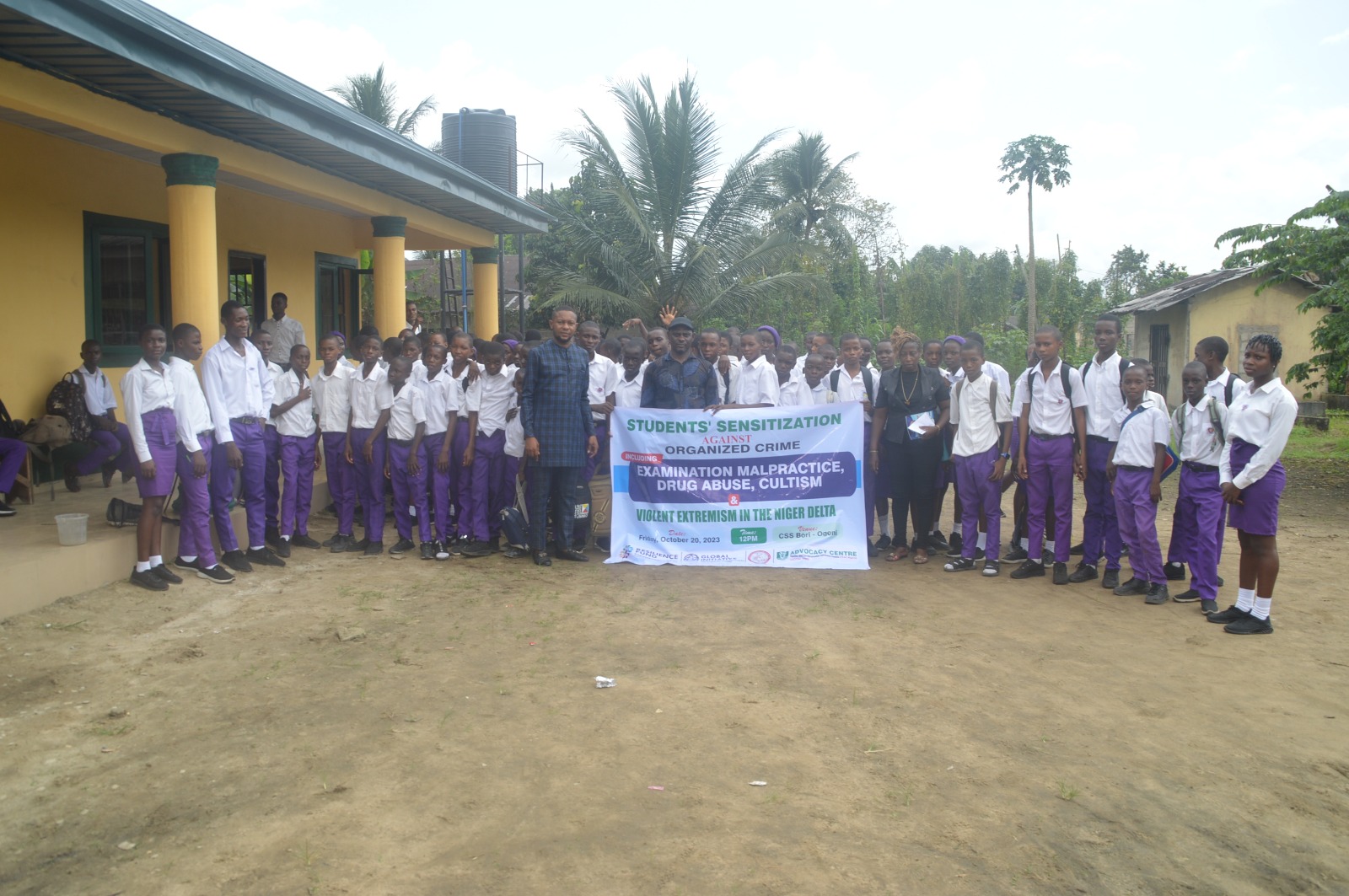By Tina Amanda
The Youths and Environmental Advocacy Centre, YEAC-Nigeria has sensitized students of secondary school in Rivers State, against organized crimes, drug abuse, cultism, exam malpractice, and violent extremism in Niger Delta amongst other vices.
Executive Director of YEAC Nigeria, Fyneface Dumnamene Fyneface, speaking during the sensitization workshop for students of Community Secondary School, Bori, described organized crimes as a category of transnational, national, or local groupings of highly centralized enterprises run by criminals to engage in illegal activities, most commonly for profit.
Fyneface blamed the rising cases of exam malpractice in secondary schools on parenting failure, corrupt educational system, poor student attitude, societal failure, undue emphasis on academic results/certificates acquisition against knowledge, and inadequate preparation by students.
According to him, organized crimes are continuously maintained through the corruption of public officials and the use of intimidation, threats, or force to protect their operations.
“Organized crimes manifest in the form of pipeline vandalism, crude oil theft, artisanal refining, illegal bunkering, kidnapping, banditry, insurgency, racketeering, cybercrimes, internet fraud (aka Yahoo-Yahoo), drugs/human trafficking, arms smuggling, sea piracy; Illegal, unreported and unregulated fishing, other fraudulent activities and environmental crimes, including illegal logging and even examination malpractice.”
He described examination malpractice as a deliberate wrongdoing contrary to official examination rules designed to place a candidate at an unfair advantage or disadvantage and warned the students that the penalty for exam malpractice under the 1999 Examination Malpractice Act included a year jail term or a fine of N100,000.
“Examination malpractices include dubbing, sorting, copying, writing on the body, use of sign language, impersonation, leakage of exam questions, tampering with results, bribery, sex-for-marks, use of mercenaries, computer fraud during computer-based exams, fraudulent practices by invigilators, among others.
“Effects of examination malpractice include, dismissal, termination, loss of position, lack of self-confidence, loss of trust in the educational system, reduced enrolment of students in school, cancellation of results, discourages good students/candidates from studying hard, deprives innocent students’ opportunity for admission, decreases job efficiency, prostitution, stealing and armed robbery.”
On drug and substance abuse, the YEAC-Nigeria Director, cautioned students against involvement in drug abuse by not succumbing to peer pressure or using drugs illicitly, noting that the United Nations has set aside June 16 every year as a special day to raise more awareness on drug abuse.
“Effects of drug abuse on youths can be physical, psychological, and social effects. Drug abuse contributes to academic difficulties, and severe health-related problems including increased risk of mental health/disorders, damage to vital organs, poor peer relationships, and involvement with the juvenile justice system, drives poverty to you and even to your family, and makes you unemployable, etc.”
Fyneface further discouraged the students from the use of violence to achieve ideological, religious, or political goals, including terrorism and other forms of politically motivated and communal violence, while warning that violent extremism undermines peace and security, human rights, and sustainable development.
“Factors that push individuals to violent extremism include marginalization, inequality, discrimination, persecution and limited access to quality education; the denial of rights and civil liberties; and other environmental, historical, socio-economic grievances, the confluence of weak and illegitimate governance, economic decline, and the worsening effects of climate change. Other root causes include arms proliferation, high unemployment, poverty rate, the politicization of security agencies, and the misappropriation of resources, etc”.
He encouraged education and sensitization as a powerful tool that builds learners’ resilience to violent extremism and mitigates the drivers of the phenomena.
“Education and sensitization help in strengthening the commitment of youths to non-violence and peace in particular by addressing hateful and violent narratives. It is not enough to counter it, we must prevent it through advocacy like this workshop organised by YEAC-Nigeria.”




